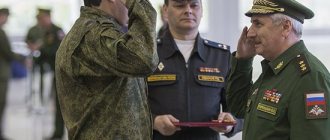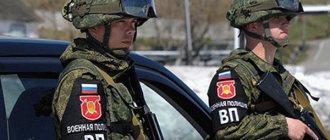Types of disciplinary sanctions
There are the following types of penalties for military personnel:
- rebuke;
- severe reprimand;
- deprivation of leave;
- deprivation of insignia;
- non-compliance warning;
- demotion;
- demotion;
- demotion and simultaneous reduction in rank;
- early dismissal (for contract employees);
- expulsion from a military university (for cadets);
- disciplinary arrest.
Warnings of incomplete compliance and early dismissal are not applied to conscript soldiers and sailors, and disciplinary arrest is applied only to male conscript or contract servicemen below the rank of warrant officer or midshipman.
Only one type of penalty can be imposed for one offense.
Foreclosure procedure
The penalty is applied in the following order:
- The military commander initiates proceedings.
- The fact of the offense, its causes and circumstances , as well as the perpetrators are established.
- A violation protocol is drawn up.
- The boss imposes a penalty or sends the case for consideration to higher management or to the court.
During the investigation it is necessary to establish:
- the event of the offense (place, time and method of its commission);
- causes, circumstances and consequences of the offense;
- presence of guilt, motives;
- characteristics of the perpetrators;
- existence of exceptional circumstances;
- presence of aggravating and mitigating circumstances.
If an offense is committed by several persons, then the degree of guilt and participation of each is established.
The misconduct report must contain the following information:
- Full name, title and position of the compiler;
- Full name of the culprit, his passport details, rank and position;
- military unit number;
- list of witnesses to the offense;
- list of evidence;
- explanation of the culprit;
- circumstances of the offense;
- list of attached documents;
- date, seal and signature of the unit commander.
Evidence of misconduct may include explanations of the perpetrator, testimony of witnesses, explanations of specialists, as well as documents, photographs and videos.
If a decision is not made, the protocol is sent to higher military authorities. Notification to higher authorities is mandatory if the offense has a criminal or administrative component.
A penalty imposed by the unit commander may be replaced by higher management with a more severe one, but cannot be reduced or canceled unless the re-trial does not exclude or reduce the guilt of the offender.
Legal consultation: Proceedings regarding gross disciplinary offense
Question:
I am a serviceman of the FSB PS and committed a gross disciplinary act on April 30th. He gave an explanation of the fact on May 17, signed an acquaintance with his rights on May 31, and the proceedings continue. I ask you to clarify the timing of the proceedings and the possibility of appealing to military justice.
Andrio, 30 years old, Sukhum
Answer:
In accordance with Art. 81 of the Disciplinary Charter of the Armed Forces of the Russian Federation, approved by Decree of the President of the Russian Federation of November 10, 2007 No. 1495 “On approval of general military regulations of the Armed Forces of the Russian Federation” (Disciplinary Charter of the Armed Forces of the Russian Federation), the decision by the commander (chief) to apply a disciplinary sanction to a subordinate serviceman is preceded by a trial .
The proceedings are carried out in order to identify the perpetrators, identify the causes and conditions that contributed to the commission of a disciplinary offense.
The proceedings, as a rule, are conducted by the immediate commander (superior) of the serviceman who committed the disciplinary offense, or by another person appointed by one of the direct commanders (superiors). In this case, the serviceman appointed to conduct the proceedings must have a military rank and military position not lower than the military rank and military position of the serviceman who committed the disciplinary offense.
In the cases specified in Art. 75 of this Charter, the proceedings are conducted by the head of the garrison, the senior naval commander, the military commandant of the garrison, the head of military communications on modes of transport, the head of military roads, the military commandant of the railway (water) section and station (port, airport) or persons appointed by them.
The proceedings, as a rule, are conducted without the preparation of written materials, except for cases where the commander (chief) has demanded that the materials of the proceedings be submitted in writing.
The materials of the proceedings regarding gross disciplinary offenses are documented only in writing.
During the proceedings it must be established:
event of a disciplinary offense (time, place, method and other circumstances of its commission);
the person who committed the disciplinary offense;
the serviceman’s guilt in committing a disciplinary offense, the form of guilt and the motives for committing a disciplinary offense;
data characterizing the personality of the serviceman who committed a disciplinary offense;
the presence and nature of the harmful consequences of a disciplinary offense;
circumstances excluding disciplinary liability of a serviceman;
circumstances mitigating disciplinary liability and circumstances aggravating disciplinary liability;
the nature and degree of participation of each of the military personnel in the commission of a disciplinary offense by several persons;
reasons and conditions that contributed to the commission of a disciplinary offense;
other circumstances that are important for the correct resolution of the issue of bringing a serviceman to disciplinary liability.
The commander (chief) has the right to decide to punish a serviceman who has committed a disciplinary offense using his own authority or, within up to 10 days, to submit to a superior commander (chief) the materials of the proceedings on the commission of a disciplinary offense by the serviceman for a decision to be made.
When a serviceman commits a gross disciplinary offense (Appendix No. 7) or upon receiving information about its commission, the immediate commander (superior) of the serviceman is obliged to immediately report this in the prescribed manner to the commander of the military unit.
The commander of a military unit decides to conduct an investigation into the commission of a gross disciplinary offense and appoints someone responsible for its conduct.
The investigation into the fact that a serviceman has committed a gross disciplinary offense ends with the drawing up of a protocol (Appendix No. 8). When conducting proceedings regarding the commission of a gross disciplinary offense by a group of military personnel, a protocol is drawn up in relation to each of these military personnel.
The protocol, along with the materials of the proceedings, is provided for review to the serviceman who has committed a gross disciplinary offense, after which it is sent to the commander of the military unit for consideration. The commander (chief) or the person who conducted the proceedings sends a proposal to the commander of the military unit regarding the period of disciplinary arrest that would be appropriate to assign to the serviceman, or to apply another type of disciplinary sanction to him.
The commander of a military unit is obliged, within up to two days, to review the protocol and materials on the commission of a gross disciplinary offense and make a decision either to send them to the garrison military court, or to apply another disciplinary sanction to the serviceman as provided for in this Charter.
In cases where the circumstances of a serviceman committing a gross disciplinary offense are established by a previously conducted audit, inspection or administrative investigation or materials on an administrative offense, a hearing by the commander of the military unit may not be ordered. If a trial is not scheduled, the commander of the military unit appoints an officer to draw up a protocol and determines the period for its preparation, which should not exceed three days.
If during the proceedings it turns out that the disciplinary offense contains signs of a crime, the commander of the military unit, in accordance with the legislation of the Russian Federation, initiates a criminal case and notifies the military prosecutor and the head of the military investigative body of the Investigative Committee of the Russian Federation.
According to Art. 83 of the Disciplinary Charter of the Armed Forces of the Russian Federation, the application of a disciplinary sanction to a serviceman who has committed a disciplinary offense is carried out within 10 days from the day when the commander (chief) became aware of the disciplinary offense committed (not counting the time for conducting proceedings, criminal proceedings or case of an administrative offense, the time of illness of the serviceman, his presence on a business trip or leave, as well as the time of his performance of a combat mission), but before the expiration of the statute of limitations for bringing the serviceman to disciplinary liability.
A serviceman who considers himself innocent has the right to file a complaint within 10 days from the date of application of the disciplinary sanction.
Andrio, as a general rule, the period for conducting the proceedings is 30 days; if necessary, this period can be increased by 30 days. You can appeal against actions (inaction) of officials that violate rights and legitimate interests by contacting the Military Prosecutor's Office and in court.
Alexander Tomenko, military lawyer
Ask your question
Withdrawal procedure
A disciplinary sanction is lifted from a serviceman in the following cases:
- by decision of the garrison court;
- upon execution (for arrest);
- if the offender is particularly distinguished;
- after a year.
If the person guilty of a misdemeanor does not agree to admit his guilt, he can send a complaint to higher authorities or to the garrison court with a demand for a review of the case. It is important to take into account that the decision to review does not mean the suspension of an already imposed penalty (for example, the lifting of a disciplinary arrest).
If, during the re-trial, it is established that the serviceman is completely innocent, the penalty will be lifted from him, and a record of complete rehabilitation will be made in his personal file.
Cases of exclusion of disciplinary liability
Disciplinary liability does not occur if one of the following facts is established during the proceedings:
- the offense was committed while strictly executing an order;
- the accused acted in self-defense;
- the offense was committed during the arrest of the criminal;
- there was an urgent need;
- the offense was the result of a justifiable risk for the common good;
- the offense was committed under physical or psychological coercion.
To recognize an offense as a justifiable risk, it is important that a similar result could not be achieved without risk and that the probability of a favorable outcome is not minimal.
Proceedings for a disciplinary offense are terminated if there is no event of misconduct or it cannot be determined, if the misconduct was committed by a mentally ill person, or if at the time the offense was committed, a federal law classifying the actions of a military serviceman as a violation was repealed.
A disciplinary sanction is imposed by the military authorities only if the offender’s guilt is proven during a thorough investigation, while irremovable doubts in the evidence, as well as the lack of necessary evidence, must be interpreted in favor of the accused serviceman.
5 minutes Author: Elena Pavlova 303
- On duties and disciplinary power
- Range of possible punishments in the army
- Incomplete list of offenses for which penalties are imposed
- Rules for imposing punishment in the army
- Briefly about the deadlines
- Appealing a disciplinary order
- Results
- Video on the topic
Expert opinion
Kozlov Andrey Kirillovich
Lawyer with 10 years of experience. Specialization: criminal law. More than 3 years of experience in developing legal documentation.
Military discipline is one of the foundations of the combat readiness of the Armed Forces of the state. Unquestioning obedience to orders and compliance with statutory requirements in peacetime ensure the coherence of the unit’s actions in combat conditions.
Incentives and disciplinary sanctions applied to military personnel are regulated by one of four legal military documents - the Disciplinary Charter of the Armed Forces (AF) of the Russian Federation. The legislative basis for the use of a system of rewards and punishments is the Law “On the Status of Military Personnel.”
List of gross disciplinary violations of military personnel
Not every act of a serviceman, which may not satisfy the interests of his commander, is a violation of a disciplinary nature. The legislator has developed a specific list of gross offenses for which appropriate sanctions are applied to a person serving in the ranks of the RF Armed Forces. These include:
- Failure to comply with statutory requirements in relations with superiors;
- Unauthorized departure from the place of duty;
- Absence from work during the entire working day without specifying valid reasons;
- Violation of the time of arrival at the military unit from the vacation period or dismissal;
- Negligence in performing or complete failure to complete assigned tasks;
- Violation of the rules for handling entrusted weapons;
- Failure to comply with combat duty requirements;
- Inaction of an officer upon detection of a conflict situation, including a fight, or non-compliance with the daily routine by subordinate military personnel;
- Failure to comply with the provisions of the charter, which set out the rules for wearing a uniform;
- Causing any type of damage to a fellow soldier, including harm to health, material values, or the psychological state of a person;
- Intentional destruction, damage or use of state property provided to a military unit for use in the process of serving;
- Negligent attitude towards the protection and conservation of entrusted military property during service;
- Appearing at work under the influence of alcohol, drugs or other toxic substances, as well as refusal to undergo a medical examination to confirm this fact.
On duties and disciplinary power
The penalties to which a military member may be subjected do not necessarily have to have an administrative or criminal basis. Most penalties applied to personnel relate to violations of military discipline and failure to fulfill military duties.
The main obligations of a person in uniform include:
- loyalty to the Ceremonial Oath (oath) and the fundamental Law of the State (Constitution);
- accurate execution of orders;
- adherence to statutory rules;
- respect for commanders and military leaders;
- strict security of information related to state secrets;
- strengthening military camaraderie;
- decent behavior;
- impeccable outfit.
Disciplinary power, that is, the right to decide on punishment and reward, is vested in unit commanders. The rights granted to subordinate commanders are always possessed by the higher command. Penalties imposed on subordinates are a method of educational work.
Its main functions are as follows:
- awareness of wrongdoing;
- carrying out punishment corresponding to the offense;
- prevention of violations of military discipline.
- development of one of the key qualities of a warrior - self-discipline.
Penalties in the army are divided into several types, and are imposed according to the principle: one violation - one punishment. That is, several types of penalties cannot be applied to a fighter for the same offense. The application of a specific type of disciplinary action to military personnel depends on the severity of the offense committed.
The analysis of rewards and penalties is carried out in each division in the form of a card index. You can get acquainted with the information entered in the service card once every six months, against signature. Upon promotion in rank, information about penalties imposed is canceled, along with the old service card. The new card contains information about the rewards received.
When is disciplinary action prohibited?
In a number of cases, when, after conducting an inspection, the commander can identify circumstances that will exclude the possibility of applying disciplinary sanctions to military personnel. A serviceman cannot be held accountable for actions or inaction:
- Committed in self-defense and protection of civilians;
- When protecting the state from a dangerous situation for it;
- Related to the detention of criminals for their subsequent transfer to authorities;
- If their benefit to society has been proven, and the purpose of the committed act was to prevent unfavorable events that pose a threat to the life, health, interests of citizens or the state;
- They were committed under duress, as a result of which the serviceman could not fully control himself and control his actions.
They also cannot; they are allowed to be held accountable if there is no direct evidence that confirms that an offense has been committed.
ATTENTION: watch a video with tips on how to get housing for military personnel, terminate a contract and defend your right. Subscribe to our YouTube channel and through the comments to the video you can consult a military lawyer for free to solve your problem.








